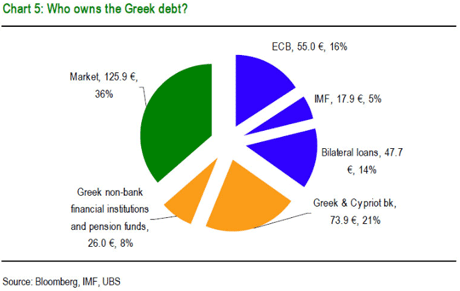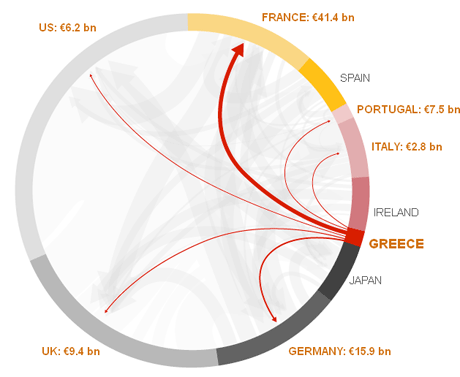Why you’ll pay for the Greek exit
A Greek default and spectacular exit from the euro are looking ever more certain, says Bengt Saelensminde. But who stands to lose the most?
Get the latest financial news, insights and expert analysis from our award-winning MoneyWeek team, to help you understand what really matters when it comes to your finances.
You are now subscribed
Your newsletter sign-up was successful
Want to add more newsletters?

Twice daily
MoneyWeek
Get the latest financial news, insights and expert analysis from our award-winning MoneyWeek team, to help you understand what really matters when it comes to your finances.

Four times a week
Look After My Bills
Sign up to our free money-saving newsletter, filled with the latest news and expert advice to help you find the best tips and deals for managing your bills. Start saving today!
Well I'm sure you've had your fill of the 'Grexit' story. It was all over the news and papers at the weekend. Everyone's talking about it.
Of course the very real possibility of a Greek exit from the eurozone is hardly news to us here at The Right Side.
So let's move on to the bigger question. And that is: Who pays if Greece exits?
MoneyWeek
Subscribe to MoneyWeek today and get your first six magazine issues absolutely FREE

Sign up to Money Morning
Don't miss the latest investment and personal finances news, market analysis, plus money-saving tips with our free twice-daily newsletter
Don't miss the latest investment and personal finances news, market analysis, plus money-saving tips with our free twice-daily newsletter
You pay!
The Greeks are, how shall I put it, very upset.
They're upset with the main political parties, who many feel have sold them out to the wicked Europeans. Youth unemployment is over 50%, while in Germany, it's fallen. Greek banks are haemorrhaging cash, while it piles up in Germany. Greek bond yields are heading out of the ball-park, while the German government can borrow for practically nothing.
The words the public want to hear are uttered by an effervescent young-gun politician called Alexis Tsipras. And his calming words are something like: Let's just dump our debt obligations.
And the obvious question we should be asking ourselves is...
Who loses?

If Greece exits the euro, then the question is, how much will lenders get back? Of course nobody knows, nor do they know which currency they may get back. But we do have an idea of who's holding the debt.
As the graphic shows, Greek debt holders can be split intothree distinct groups, all of them with about a third each. There's the ECB/IMF, who have bought in to try to stabilise the Greek debt market. There's the Greek and Cypriot banks, that bought in for regulatory reasons (a risk-free asset for bank reserves) and pension savings. And last, but not least, there's everyone else, or the market' and that could include your pension fund.
But don't worry too much, as it's much more likely to be French pension funds or banks left holding the baby. The following graphic explains why...
Who does Greece owe?

Source: BBC
I can see 41 billion reasons why the French are keen to keep Greece within the eurozone!
But an exit will hurt the Greeks most
Though I have argued strongly that it's in Greece's interests to leave the eurozone, I'm not for one moment suggesting it's going to be easy.
The rest of the world can probably cope with 'Grexit'. It's only if other countries follow her out the door that we're in big trouble. But for Greek banks and pension funds, it'll be shocking. They're filled to the rafters with their own Greek debt.
Older (and wealthier) factions of Greek society will pay a very heavy price in the event of 'Grexit'.
It's little wonder that euros are heading out of Greek bank accounts. If you face losing a large chunk of your pension, then you're not going to run the risk of your cash going up in smoke too.
Greek businesses will be next to suffer
I remember when Argentina faced a similar exit. I remember it well, because I was in the throes of an important business deal with an Argentinean. And it nearly bust my business...
Argentina faced an exit from its dollar peg. Argentina was in a similar situation to Greece today. Basically, her currency was pegged' to the US dollar, and had been for ten years. But given the distortions caused by an ill-fitting monetary union, it couldn't hold on. Deficit spending and debt had become too onerous. So the Argentineans needed loans from the IMF to keep up the charade of monetary union.
Everyone could see what was happening. Bank accounts were being emptied as holders feared a currency devaluation.
I'd just started a food import business. And one of the first deals I did was the sale of two containers of organic honey to a large UK buyer.
I had signed a contract that promised to deliver. But suddenly our Argentinean supplier didn't want to go through with the deal. He didn't want our dollars he was frightened that once received, the cash would be debased. He said he'd rather sit on his honey. For him it was literally liquid gold.
And he was right... upon exit, the value of the peso fell to about a quarter.
Thankfully I was able to wriggle out of the deal with the UK buyer. But they weren't happy, and they could have made me go out and buy the honey elsewhere and deliver it to them at a massive loss.
The point is, when you start publicly debating the exit from monetary union, international business grinds to a halt. Nobody does anything for fear of converting their hard work into debased currency.
I say if Greece heads out the door, it should be done as quickly as possible. Greece can't afford a drawn out withdrawal. Every day spent in limbo causes more and more economic heartache.
The pain is going to be shocking. But not as shocking as hanging on.
Somebody ought to tell the politicians.
This article is taken from the free investment email The Right side. Sign up to The Right Side here.
Important Information
Your capital is at risk when you invest in shares - you can lose some or all of your money, so never risk more than you can afford to lose. Always seek personal advice if you are unsure about the suitability of any investment. Past performance and forecasts are not reliable indicators of future results. Commissions, fees and other charges can reduce returns from investments. Profits from share dealing are a form of income and subject to taxation. Tax treatment depends on individual circumstances and may be subject to change in the future. Please note that there will be no follow up to recommendations in The Right Side.
Managing Editor: Frank Hemsley. The Right Side is a regulated product issued by Fleet Street Publications Ltd.
Fleet Street Publications Ltd is authorised and regulated by the Financial Services Authority. FSA No 115234. https://www.fsa.gov.uk/register/home.do
Get the latest financial news, insights and expert analysis from our award-winning MoneyWeek team, to help you understand what really matters when it comes to your finances.
Bengt graduated from Reading University in 1994 and followed up with a master's degree in business economics.
He started stock market investing at the age of 13, and this eventually led to a job in the City of London in 1995. He started on a bond desk at Cantor Fitzgerald and ended up running a desk at stockbroker's Cazenove.
Bengt left the City in 2000 to start up his own import and beauty products business which he still runs today.
-
 Can mining stocks deliver golden gains?
Can mining stocks deliver golden gains?With gold and silver prices having outperformed the stock markets last year, mining stocks can be an effective, if volatile, means of gaining exposure
-
 8 ways the ‘sandwich generation’ can protect wealth
8 ways the ‘sandwich generation’ can protect wealthPeople squeezed between caring for ageing parents and adult children or younger grandchildren – known as the ‘sandwich generation’ – are at risk of neglecting their own financial planning. Here’s how to protect yourself and your loved ones’ wealth.